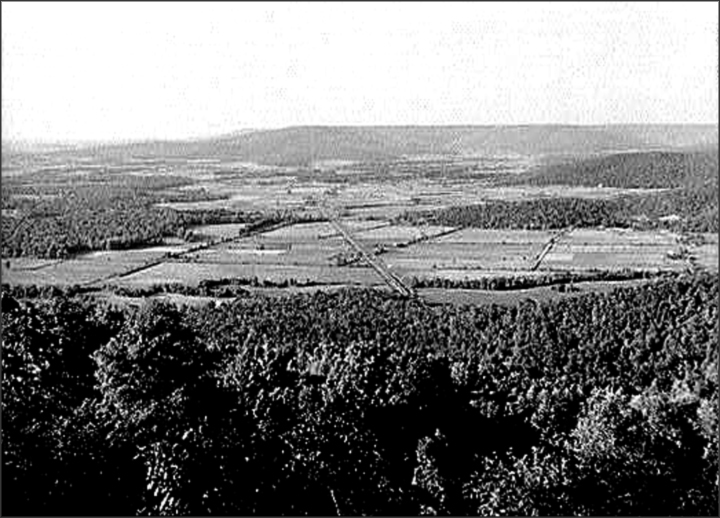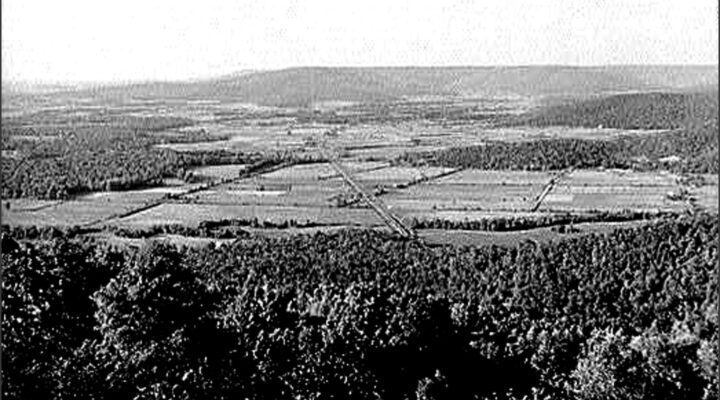Did you ever wonder what it was like to travel through East Tennessee around the late 1800s? Today’s column will afford you that opportunity based on a document written by someone known only as ODT, who traveled to the area in 1877. Overall, the trip details are glowing with only a hint of negativity.
The writer’s stated purpose for the trip was to make a case for people living in the crowded north to come to the unpopulated pristine mountains of the South. He or she traversed the region through Virginia and Tennessee with a particular focus on the Cumberland Plateau region of East Tennessee.
Clean invigorating air, pure water, mild healthful climate and especially low-priced land quickly captured his attention, but he was shocked to hear valley people describe land in the mountains as worthless for agricultural purposes. But it was possibly of great value for its plentiful coal and iron deposits across the plateau.

Vintage Photo of the Cumberland Plateau
Surprisingly, Mr. ODT learned that many of the inhabitants had migrated there from the north. Properly cultivated land was very fertile and yielded abundant and consistent crops. Nearly all the produce grown in the north grew equally well in a Southern climate. He was astonished at how good apples and potatoes grown in the region tasted. Delicious pears, quinces (hard apple-like seeded fruit edible only when cooked), grapes and berries all grew rapidly.
Mr. T found out that wild grass abundantly thrived everywhere among the timber and all over the plateau. The raising of cattle and sheep was the most profitable business for farmers. There was a great abundance of fine timber available, which at that time had little market value except for sporadic house building and putting up or repairing fencing along property lines.
However, the mysterious writer from yesteryear felt it would ultimately become important for manufacturing purposes, especially with a variety of oak, chestnut, hickory, maple, poplar and white and Southern pine. The land’s elevation had a stabilizing effect on the temperature, making winters mild and short and summer heat less severe than those in Northern states.
A cool breeze made summer nights highly comfortable, especially with windows partially open. Medical statistics from that era showed that the area was one of the healthiest sections of the country with its abundant springs of untainted water, many of them believed to be medicinal. Everywhere were creeks, branches and running streams. The 1877 traveler indicated that he walked several miles through forest after forest without encountering a single pool of tainted water. It was not to be found.
O’s words about the native population were equally interesting; he judged them to have an easy, kindly disposition, but indicated they were uneducated and a bit laid back. They appeared fully satisfied with their diminutive crudely-built log house and a small patch of potatoes out back. The residents supplemented their diet with fresh deer meat that was easily obtained on the plateau. The friendly inhabitants readily embraced immigration from their Northern settlers.
The mountaineer’s biggest drawbacks were a lack of schools to educate children and no effort to maintain a definitive culture. This deficiency resulted in a tendency for each family to live in isolation. On the plus side, an abundance of choice land was located near the railroad and adjacent to the river, which could be purchased for prices ranging from $2 to $5 an acre.
The writer concluded his comments by summarizing his feeling for the potential of the sparsely settled East Tennessee area: “I believe this to be the true idea of settling a new country. If a number of families, agreeable to one another, would locate close together where they could have a school and society and mutually assist and encourage each other, they would with proper management very soon build up comfortable and independent homes.”
Thank you Mr. ODT for sharing your nostalgic document with us. You made me want to turn an old antique clock back to the golden days of yesteryear.
